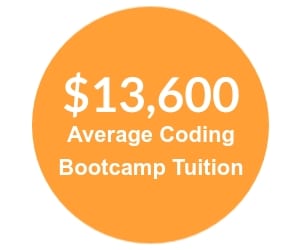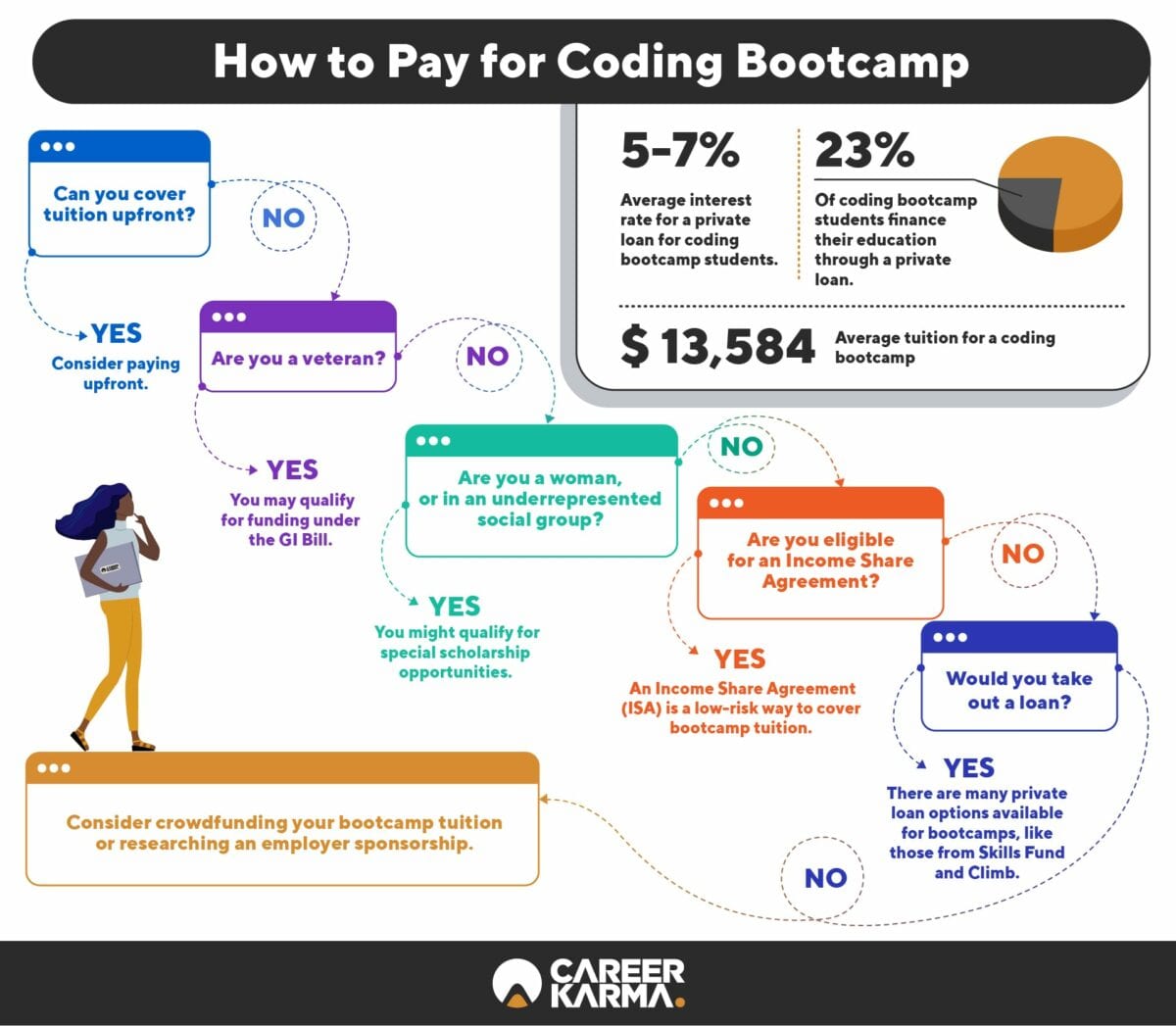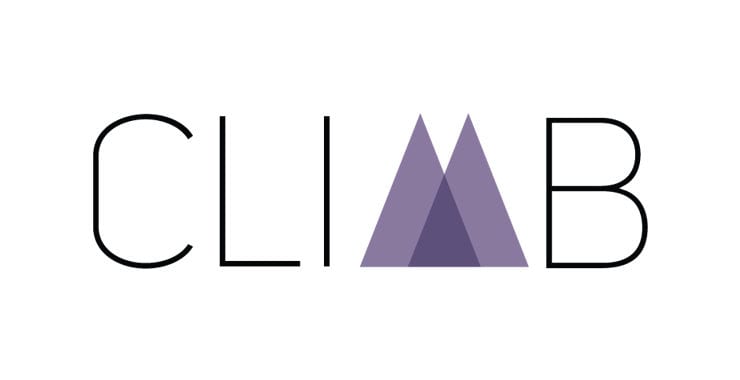Coding bootcamps are among the best ways to break into an exciting and fulfilling career in tech. However, many aspiring coders are concerned about the cost of coding bootcamps. While there is no form of FAFSA for coding bootcamps, you can pay for your education with loans for coding bootcamps and other aid programs.
This comprehensive guide will give you all the information you need to make a smart decision about how to pay for coding bootcamp. We’ll teach you about the different financing options, including private loans, monthly payment, government funding, and personal funding. Read below to learn more about paying for an online coding bootcamp.
What Are Coding Bootcamps?
The best coding bootcamps are short-term, immersive training programs that focus on helping people develop the skills they need to succeed in a specific tech career. Recent growth in the technology sector has led to a spark in demand for workers with specialized skills in technology.
Coding bootcamps emerged as a new type of institution to fill the gap in education training. Accredited coding bootcamps are an excellent alternative to traditional universities to acquire a programming education and kickstart a tech career. Graduates can become software developers, UX designers, software engineers, product developers, and more.
Reasons to Go to a Coding Bootcamp
Coding bootcamps are particularly popular among those who are looking to transition into new careers in technology. Bootcamps are also popular among those who are looking to build new skills to help them unlock better jobs in the evolving workforce.
This is largely because coding bootcamps are focused on helping students get hired after they graduate. This is a key benchmark that bootcamps use to measure their success. Many of the best coding bootcamps offer comprehensive career support to their students. Bootcamps also offer technical interview practice to help candidates prepare for the job search process.
Coding bootcamps have developed a new model of education focused on skills acquisition and employability. Bootcamps have also built a good reputation for investing in student success. This is contrary to colleges and universities, which often invest in non-academic resources such as administration and amenities for students.
Differences Between Coding Bootcamps and Universities
The expectation for a coding bootcamp is different from that of a university. Prospective students at a coding bootcamp can expect to learn a variety of new skills in a short period of time. Upon graduating, they should be able to find a good job with those skills.
Bootcamps are not a replacement for universities for many reasons. Namely, bootcamps are usually unaccredited and thus cannot award degrees. However, they are a great alternative to traditional education for people looking to pursue a lucrative career in tech.
College vs Coding Bootcamp Cost
Despite being significantly cheaper than a university degree program, paying for a coding bootcamp can be difficult. Many people think they can’t afford to go to a coding bootcamp. Luckily, bootcamps offer a wide variety of financing options for students.

Cost of Tuition for Traditional College
College tuition and fees cost up to $37,600 per year in 2019, according to the National Center for Education Statistics. This depends on if you go to a private or public school, but in general, college costs are very high. This is because when you pay for college, you pay for access to its campus and student services. The average cost is even higher if you live in a dorm.
Coding Bootcamp Cost
According to research conducted by Career Karma, bootcamp training programs cost an average total of $13,600. This is much lower than annual tuition at a college. Coding bootcamps offer a great way for people to accelerate their knowledge of various technical concepts without spending too much money.
Choose a method of financing that is both flexible and manageable compared to how much you can expect to earn as a graduate. If you invest some time upfront evaluating your financing options, you are more likely to get the most out of your coding bootcamp education. With so many payment options available, you’re sure to find a method that works for you.
Coding Bootcamp Financing
Before you attend a coding bootcamp, it is important to understand all the financing options. In the article below, we will cover the main coding bootcamp financing options available for prospective and current students. We will also cover the long-term results of paying for a bootcamp with these coding bootcamp financing options.
How to Pay for Coding Bootcamp
Let’s look at an overview of how you can pay for coding bootcamp. Although there is no federal student aid like a college might have, there are countless payment options at a bootcamp. Whether you have excellent credit or have been struggling financially, you can find something that works for you. Coding bootcamp financing options include:
How to Pay for Coding Bootcamp
- Upfront Payment
Paying tuition upfront is the lowest-risk option. However, you need to be able to afford the large lump sum.
- GI Bill
GI Bill benefits for veterans are a great way to pay for bootcamp if you are a veteran.
- Coding Bootcamp Scholarships
Coding bootcamp scholarships are available for aspiring coders. Scholarships provided by bootcamps or coding organizations usually cover a portion of the tuition.
- Income Share Agreement
Income share agreements are a way to pay for bootcamp where payments are adjusted depending on the salary one earns after graduating from a bootcamp program.
- Private or Personal Loans
Loans are a common option for many bootcamp students. Many loan providers partner with coding bootcamps to provide special financing options.
- Crowdfunding
Crowdfunding is a great way to come up with some or all of your bootcamp tuition.
- Employer Sponsorships
Some employers might be willing to sponsor your bootcamp training. Bootcamp employer sponsorship is a great option if you already work in the tech field. It allows you to attend coding bootcamp while working.

Federal Financial Aid for Coding Bootcamp
Unfortunately, there is no FAFSA for coding bootcamps. In fact, government grants for coding bootcamps are hard to obtain. Pell Grants and federal student loans are not available to coding bootcamp students.
Fortunately, in 2016, the Office of Educational Technology announced the Educational Quality through Innovative Partnerships program, or EQUIP. This program allows students to apply for federal financial aid including Pell Grants and federal loans.
This helps students to afford non-traditional education, such as an online course or a coding bootcamp. However, there is currently only one approved university that partners with EQUIP. It is possible that this will change in the future.
Coding bootcamps are not accredited, which is why most federal funding options do not apply to these educational institutions. The GI Bill and VET TEC are both options that military veterans and their families can take advantage of. In fact, a large number of coding bootcamps accept the GI Bill.
The GI Bill for Coding Bootcamp

The GI Bill was passed in 1944 after World War II. It was designed to help veterans reacclimate to civilian life. It gives them the capital they need for education, buying a home, or starting a business. In recent years, the money given to veterans for further education is now available to students who enroll in a short-term coding bootcamp.
Under the Post-9/11 version of the bill, veterans may be eligible for up to 36 months of college or career training. Eligible students must have been discharged honorably or still be on active duty. They also must serve or have served at least 36 months on active duty for the full suite of benefits. This includes money that can be spent on educational materials and living expenses.
Be sure to check out the full list of bootcamps eligible for GI Bill funds. Some of the coding bootcamps that accept the GI Bill are Codeup, General Assembly, Code Platoon, Galvanize, and DigitalCrafts. The GI Bill can be the answer if you are concerned about how to pay for coding bootcamp. Some of the benefits are offered even if you have served for less time.
Coding Bootcamp Scholarships and Grants
There are also many coding bootcamp scholarships available, which can help students attend their bootcamp of choice. These bootcamp scholarships typically have a specific type of student they aim to fund. For example, some bootcamps offer discounts to some students after a new course has been launched.
Other programs offer bootcamp scholarships for women and underrepresented groups. Flatiron School, for example, has awarded over $1 million toward women’s coding education through its Women Take Tech scholarship fund. Some bootcamps have exclusive scholarship funds for veterans and military personnel.
Scholarships are a good option for students who are eligible because they do not need to be paid back. This means that students can attend a bootcamp and only pay for the cost of equipment and resources. Without worrying about tuition payments, students can start a tech job.

"Career Karma entered my life when I needed it most and quickly helped me match with a bootcamp. Two months after graduating, I found my dream job that aligned with my values and goals in life!"
Venus, Software Engineer at Rockbot
Some bootcamp scholarships are partial, which means they discount a large part of tuition but not the whole cost. Others are full scholarships, which means they will cover the full amount of tuition for students. Bootcamps such as General Assembly, Flatiron School, and Hack Reactor offer scholarships to their students.
Scholarships for Women STEM Bootcamps
The tech industry continues to be male-dominated. According to a report from Statista, women make up less than 30 percent of tech positions at top companies. Fortunately, more and more women are entering the field thanks to the wide availability of scholarships for women in STEM.
Women have access to a slew of scholarships to fund their bootcamp education. Below, we list some of the most prominent STEM scholarships for women who want to join a bootcamp:
- Sabio | Jill H. Mays Scholarship | $5,000. Designed to empower women and expand their career opportunities, this scholarship is offered to all women interested in joining Sabio. To receive it, you must identify as female and be a new applicant.
- We Can Code IT | #YesWeCode Fund Scholarship | $1,000. This is an automatic scholarship. It is offered by We Can Code IT in partnership with the #YesWeCode Fund. It is targeted at women from ethnic minorities.
- Coding Dojo | Women in Tech Scholarship | $1,000. This scholarship is offered by Coding Dojo to aspiring female coders who need help to finance their programming education.
- Lesbians Who Tech | Edie Windsor Coding Scholarship | 50% off tuition. Named after the computer programmer pioneer, the Edie Windsor Coding Scholarship is available to LGBTQ+ women and non-binary people.
- DevPoint Labs | Women in Tech Scholarship | 50% off tuition. DevPoint Labs seeks to honor the contributions of women to the field of programming with this partial scholarship. If you are a woman seeking to enter the field of computer programming, this award will help you finance your education.
Paid Coding Bootcamps and Deferred Tuition Programs
Recently, deferred tuition programs have started to gain traction in coding bootcamps. Through these options, students will only pay the tuition cost after graduation. Schools that offer deferred tuition programs are sometimes known as paid coding bootcamps.
A deferred tuition coding bootcamp allows students to pay their tuition after graduation, assuming they earn over a certain amount. Flatiron School, for example, partnered with the We Company to start the Access Labs program. This allows students to defer paying tuition until they have found a job paying over $35,000 per year.
Income Share Agreements
A more common form of deferred tuition is a coding bootcamp income share agreement (ISA). ISAs allow students to attend a coding bootcamp with no tuition paid upfront in exchange for a percentage of their future income. Students only make payments as a percentage of their income once they graduate. They must earn over a certain amount, which is typically between $30,000 and $60,000.
This means that if a student becomes unemployed or underemployed, they will not have to make payments toward their education. Further, ISAs include payment caps that ensure successful students do not pay disproportionately for their cost of education. ISAs are not a form of loan, but rather an alternative offered by so-called paid coding bootcamps.
Income Share Agreements vs Traditional Loans
With an ISA, borrowers will only make payments when they earn over a certain amount. Traditional loans accrue interest and have a balance, which ISAs do not. ISA contracts are measured by the number of months a student has to make payments. In most cases, it reduces every month. So, in the end, choosing an ISA vs a student loan comes down to personal preference and economic circumstances.
Advantages of Income Share Agreements
The main advantage of ISAs is that they provide a more flexible payment plan for students because they will only make payments if they succeed. ISAs also align the incentives of schools and their students, so schools have a strong motive to offer high-quality, up-to-date services that help students succeed. If a student does not succeed, they will pay back very little or nothing.
Bootcamps such as Flatiron School, General Assembly, and Kenzie Academy offer ISA-based financing models to their students. ISAs also expand access to coding bootcamps for those who are unable to access other options. If a student is ineligible for a private loan, they could pay for their bootcamp through an ISA.
ISAs also focus on evaluating student potential rather than credit score when considering whether a student should be granted an ISA. This opens up access to this financing model to more students, even those with bad credit or no credit card. However, ISAs have varying eligibility requirements, so some students may not be able to access this financing option.
ISAs are not for every student. In an ISA, students may end up paying back more than they initially borrowed. This is because successful students will only stop making payments if their ISA term expires or if the payment cap is reached. This money is used to subsidize the losses from lower-earning students, which ensures that a school can continue to offer their educational services.
Coding Bootcamp Job Guarantees
If you are looking for a foolproof way to get a job in tech, some coding bootcamps offer job placement guarantees. A coding bootcamp job guarantee often comes in the form of a full or partial tuition refund if the student is unable to land a job after graduation. Usually, students will get their money back if they can’t find a relevant job in six months.
There are also coding bootcamps that guarantee the student a job or internship within the bootcamp itself or with its parent company. Revature, for example guarantees its students employment with one of its clients. Check the job placement rates at your preferred bootcamp to see how students fare in the job hunt.
Coding bootcamps with job guarantees include Byte Academy, Codeup, and CareerFoundry. However, before you join any, read the small print. These guarantees may only apply under certain circumstances. For example, the student may have to apply to a certain number of jobs per week and may not be allowed to turn down a job offer.
Attend a Tuition-Guarantee School
A tuition-guarantee bootcamp is a program that offers a money-back guarantee if you can’t find a job. Attending a tuition-guarantee program can be an excellent way to minimize risk and ensure your money is not wasted if things don’t work out as planned. Read about some of the best tuition-guarantee schools below:
- Springboard. This school is an excellent option if you want to learn data analytics, UX design, and data science online. One of the great things about it is that you’ll receive a full refund if you do not get a job within six months of completing the bootcamp.
- Thinkful. This popular coding school gives students all their money back if they are not able to land a qualifying job six months after graduation.
- Bloom Institute of Technology. BloomTech offers a tuition-guarantee program. Students are refunded the whole cost of tuition plus 10 percent if they don’t get a job offer within a year of graduation.
- CareerFoundry. This coding bootcamp is so certain it will help you land your dream job in tech that it offers a 100 percent tuition refund. CareerFoundry is an excellent option to study UI/UX design, data analytics, and web development.
- Codeup. Students who join this web development coding bootcamp but fail to get a job within 180 days of graduation receive half of their tuition back.
Paying with Coding Bootcamp Loans

Most coding bootcamps currently do not qualify for Title IV funding. This means that, at present, coding bootcamp students cannot access federal financial aid to pay for their education. In addition, Sallie Mae, a public company that offers student loans to college students, will not issue student loans to coding bootcamp students.
However, many bootcamps have their own loan programs to help students get their education. Some also partner with loan providers like Climb Credit and Upstart. Even people with no credit or bad credit can find a loan that works for them so they can attend a bootcamp.
What Are Private Loans?
Private loans are sums of money that you can get from private organizations that you have to pay back. The money you borrow can be used to cover tuition and other costs related to bootcamps, such as technology or studying resources. This means students do not need to take out an additional loan.
Private loans are a type of loan, however, which means that interest will accrue over time. Private lenders usually charge between a five and eight percent Annual Percentage Rate (APR) on their loans. This is equal to the interest rate as well as extra fees on a loan for a whole year, which can add up.
Paying for coding bootcamp with a private student loan means paying back your loans after graduation. In most cases, you cannot make contributions toward your loan until you graduate, after which the payment period will start. Make sure you’re prepared for the commitment of a loan before you sign an agreement.
Finding Private Lenders to Pay for Coding Bootcamp
Most students rely on a private lender in order to pay for their coding bootcamp. Private lenders such as Affirm, Ascent Funding, Upstart, Earnest, and Climb Credit offer coding bootcamp loans. This makes it easier for students to afford their education. You can check bootcamp reviews to see how students rate these loan options.
Loans offered by private lenders usually have shorter terms. This is because most bootcamps are shorter than other educational options such as community college or university. Students who take out private loans can expect to pay back the money they borrowed in no more than five years. Most lenders expect students to pay back their loans between one and three years.
Interest-Only Loans from Private Bootcamp Lenders
In some instances, a lending partner may offer an interest-only loan for coding bootcamps. This is a special type of loan that allows students to make interest-only payments while in school and for a few months after.
However, private loans are not accessible to all students. Private lenders examine a borrower’s credit score, savings, and income-to-debt ratio. Students with a poor financial history may be denied access to a loan. Most private lenders do allow students to have a co-signer on their loan, someone who will pay back the money if the lender defaults.

Before you take out a loan to finance your education, you should check if the bootcamp has a partnership with any lenders. If you take out a loan with a bootcamp’s partnered lender, you are less likely to experience communication breakdowns. You are also more likely to receive a good experience with the lender. Below is a breakdown of a few top private lenders and their financing plans.
| Climb Credit | Ascent Funding | Upstart | |
|---|---|---|---|
| Starting APR | 5.0% | 7.34% | 6.5% |
| Term | 3 years | 3 or 5 years | 3 years |
| Partners | Coder Camps, General Assembly, Hack Reactor | Fullstack Academy, DigitalCrafts, Coding Dojo | Launch Academy, General Assembly, Coding Dojo |
Employer Sponsorships and Crowdfunding to Pay for Coding Bootcamp
Some employers will also sponsor skills development courses for their workers. Through this model, you can ask your employer to pay for all or some of your bootcamp tuition. Employers will benefit because bootcamps can you become a more effective and productive employee. Ask your employer whether they would be willing to sponsor some or all of your tuition.
Companies that offer student loan repayment benefits may also be willing to help workers by paying off their loans. Some companies cover the cost for you to go to a bootcamp. There is also the option of crowdfunding available to those who are otherwise unable to finance their bootcamp.
There are many online crowdfunding platforms such as Indiegogo and GoFundMe that allow people to raise money for causes including education. The benefit of crowdfunding is that it can be easy to raise the money you need. There is a wide audience to target who may be interested in helping you finance your education.
However, crowdfunding does have a few problems. The main one is that you will be competing with other people who are raising money for similar causes. Therefore, you will need to craft a strong profile to maximize your chance of raising the money you need to attend a coding bootcamp.
Coding Bootcamps With Living Stipends
Believe it or not, some coding bootcamp pay you to attend. There are a few coding bootcamps that offer stipends to cover living expenses. Coding bootcamp stipends are meant to alleviate the financial burden of your education so you can focus fully on your studies.
A stipend is usually paid monthly, although some coding schools may operate on a different schedule. Some coding bootcamps don’t offer a stipend but will instead provide free housing. Other schools offer stipends that come in the form of a scholarship.
V School, for example, is a coding bootcamp with living stipend in the form of free housing and free public transportation for Career Changer students. This coding bootcamp is a great choice if you want to learn UI/UX design, web development, and full stack development.
Another coding bootcamp with living stipend is Big Nerd Ranch. Your registration fee at this bootcamp includes housing, meals, and even coffee. This school is a solid option for those pursuing a career in web development.
Choosing How to Pay for Coding Bootcamp

As we have shown in this article, there are many ways to pay for coding bootcamp. Before you settle on one, do proper research on the different coding bootcamp financing options available and coding bootcamp prices. You also need to carefully consider your own financial situation and how your chosen coding bootcamp financing option will affect it.
The wisest course of action is to begin by looking for coding bootcamps that offer scholarships. If you are a veteran, using your GI Bill benefits is a must. You may also consider a coding bootcamp with deferred tuition, although you should be aware of the terms before you agree to a coding bootcamp income share agreement.
To minimize risks, we recommend looking for coding bootcamps that offer job guarantees in the form of a tuition refund if the students fails to land a job after graduation. Keep in mind that there are also bootcamps that guarantee you a job with their parent company or a partner once you complete the program.
If you are already employed and looking to advance professionally, you may be able to get your company to sponsor your coding bootcamp education. This is an excellent way of pursuing your education at zero cost. You can tailor your school search to bootcamps that work with your employer if you work for a large company.
Alternatively, you could raise funds via a crowdfunding campaign, although crowdfunding for a coding bootcamp is often a time-consuming endeavor. If that’s not an option for you, it is worth remembering that there is also federal financial aid for coding bootcamps available via the EQUIP program.
Finally, if you are okay with paying interest, you can always take out a loan to afford the price of your coding bootcamp. All in all, there are many ways to pay for coding bootcamp. Make sure to do your due diligence to find the best coding bootcamp financing source for you.
Is a Coding Bootcamp Worth It in 2022?
Yes, a coding bootcamp is worth it. Coding bootcamps provide high-quality, industry-standard education at affordable prices. You can learn from industry experts and get job-ready in just a few weeks. Tech jobs continue to be in high demand, and coding bootcamps allow you to upskill and enter the job market quickly.
Before enrolling in a school, find out if it has independently-verified outcomes data. This means that an external body such as the Council on Integrity in Results Reporting (CIRR) has reviewed the outcomes data and verified its accuracy.
You should choose a bootcamp that covers everything you need to know and has high student outcomes. For example, if you want to attend a top cyber security bootcamp, make sure its curriculum is up to date so students are prepared for the workforce. If an institution has high student outcomes, you’re more likely to follow the same successful path.
You should assess the potential job possibilities you could access by attending a bootcamp. Find out about the expected salaries and pay increases of people in your dream career earn. This will allow you to get a better sense of how much you can expect to make after graduation.
The Bureau of Labor Statistics Occupational Outlook Handbook, for example, tells you about median pay and other requirements for positions in computer science. If you do your research, you can be on your way to becoming a bootcamp student and eventually a highly paid software developer, web designer, and more.
How to Pay for Coding Bootcamp FAQ
Yes, you can get a loan for coding bootcamps. There are multiple loan providers that offer loans to coding bootcamp students. Ascent Funding, Climb Credit, and Upstart provide low-interest loans to help cover the coding bootcamp cost. To be eligible, you must pass a credit check.
Yes, there are scholarships for coding bootcamps. Most coding bootcamps offer scholarships to underrepresented groups in tech, which usually include women, LGBTQ+ students, and people of color. Some bootcamps, like Ada Developers Academy, offer free education to women and non-binary adults.
Flatiron School, Thinkful, and Nucamp are some of the best online coding bootcamps in 2022. They allow students to learn from anywhere in the United States, often at slightly reduced rates. You can save lots of money if you live at home and avoid travel costs with an online bootcamp.
No, in most cases, you cannot use a 529 plan to pay for a coding bootcamp. You can only use a 529 account if you are paying tuition to an eligible institution. Universities are considered eligible institutions. However, most bootcamps are offered by private companies, which means that using a 529 account is not an option.
With so many financing options available, you’re sure to find a method–or combination of methods–that works for you.
About us: Career Karma is a platform designed to help job seekers find, research, and connect with job training programs to advance their careers. Learn about the CK publication.




